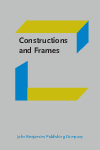
Constructions and Frames
Scope & Guideline
Bridging theory and practice in language studies.
Introduction
Aims and Scopes
- Construction Grammar:
The journal promotes research on Construction Grammar, emphasizing how linguistic constructions shape and are shaped by usage, with an eye on both synchronic and diachronic perspectives. - Usage-based Approaches:
It prioritizes usage-based methodologies that analyze language data to uncover patterns and principles governing the formation and evolution of constructions. - Cross-linguistic Studies:
The journal encourages comparative studies across languages, examining how constructions operate within various linguistic frameworks and cultures. - Cognitive and Philosophical Perspectives:
The inclusion of cognitive and philosophical reflections on grammar highlights the journal's commitment to understanding the theoretical implications of constructionist views. - Interdisciplinary Research:
The journal welcomes interdisciplinary approaches, integrating insights from fields such as cognitive science, philosophy, and social linguistics to enrich the study of constructions.
Trending and Emerging
- Integration of Large Language Models:
Recent papers are exploring the intersection of usage-based approaches and large language models, indicating a growing interest in how computational linguistics can inform construction grammar. - Philosophical and Reflective Insights:
There is an increasing trend towards philosophical reflections on the implications of construction grammar, suggesting a deeper engagement with theoretical questions about language. - Diachronic Constructional Change:
Research focusing on diachronic changes in constructional networks is gaining prominence, emphasizing the historical evolution of constructions and their semantic implications. - Multilingual and Cross-disciplinary Approaches:
Emerging themes include multilingual perspectives and interdisciplinary research that connect constructions with cognitive science, social contexts, and other areas of study. - Usage-based Characterizations:
A strong trend towards usage-based characterizations of various constructions shows the journal's commitment to empirical data and real-world language use.
Declining or Waning
- Traditional Grammar Approaches:
There seems to be a decline in papers focusing on traditional grammar frameworks, as the journal increasingly embraces usage-based and constructionist perspectives. - Static Models of Language:
Research that relies on static models of language, which do not account for the dynamic nature of language change and usage, is appearing less frequently, indicating a shift towards more fluid and adaptable frameworks. - Morphological Studies:
Although still relevant, studies specifically centered on morphological schemas and traditional morphological analyses are becoming less common, as the emphasis shifts towards constructional and usage-based approaches.
Similar Journals

Studi e Saggi Linguistici
Cultivating a Rich Exchange of Ideas in LinguisticsStudi e Saggi Linguistici is a distinguished academic journal published by EDIZIONI ETS, based in Pisa, Italy. With its ISSN 0085-6827, this journal has established itself as a vital resource in the field of linguistics, particularly noted for its contributions since its inception in 2016. Although currently categorized in the lower quartile (Q4) by the 2023 metrics in the domains of Linguistics and Language within Scopus, it remains a significant platform for innovative research and critical discussions surrounding language studies. Focusing on both theoretical and practical aspects of linguistics, the journal serves as a nexus for scholars and practitioners alike, facilitating a rich interchange of ideas and knowledge in a rapidly evolving discipline. As an invaluable publication for researchers, professionals, and students, Studi e Saggi Linguistici is committed to advancing the understanding of linguistic phenomena and fostering scholarly communication in its field.
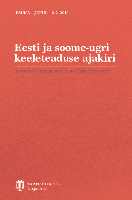
Eesti ja Soome-Ugri Keeleteaduse Ajakiri-Journal of Estonian and Finno-Ugric Linguistics
Championing Open Access to Linguistic DiscoveriesEesti ja Soome-Ugri Keeleteaduse Ajakiri - Journal of Estonian and Finno-Ugric Linguistics is a premier academic journal published by UNIV TARTU PRESS, dedicated to advancing the field of linguistics with a particular focus on the Estonian and Finno-Ugric languages. Since its inception, the journal has embraced an Open Access publishing model, allowing researchers and enthusiasts to freely explore its groundbreaking studies and findings since 2013. With an Impact Factor that places it in the Q3 quartile of leading journals within the linguistic domain, it serves as a vital platform for the dissemination of new research and theoretical advancements. Ranked 410th out of 1088 journals in the Arts and Humanities category for Language and Linguistics, it reflects a robust commitment to quality scholarship that appeals to academics, professionals, and students alike. Operating from Tartu, Estonia, the journal aims to foster greater understanding and appreciation of the Estonian language within the broader context of Finno-Ugric studies, making it an essential resource for anyone interested in these unique linguistic cultures.
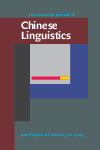
International Journal of Chinese Linguistics
Elevating Chinese Linguistics to Global StandardsInternational Journal of Chinese Linguistics is a distinguished publication that delves into various aspects of linguistic studies pertaining to the Chinese language. Published by John Benjamins Publishing Co, this journal stands out for its commitment to advancing the knowledge and understanding of Chinese linguistics within the global academic community. With an impact factor that places it in the Q2 quartile of linguistics and language, the journal is indexed in prominent databases, achieving ranks of #501 in Arts and Humanities and #580 in Social Sciences. These rankings reflect the journal's dedication to maintaining high scholarly standards and its relevance in both linguistic research and practical applications. While not categorized as Open Access, the journal provides necessary access through institutional subscriptions, thereby ensuring that valuable research reaches a broad audience. Covering a wide range of topics from syntax and phonetics to sociolinguistics and applied linguistics, the International Journal of Chinese Linguistics serves as an essential resource for researchers, professionals, and students seeking to deepen their understanding of the intricate relationship between language and culture in the Chinese context. With converging years from 2019 to 2024, it continues to evolve, reflecting ongoing developments in the field.
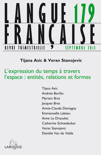
LANGUE FRANCAISE
Unveiling the Nuances of Francophone DiscourseLANGUE FRANCAISE, published by LAROUSSE, stands as a premier journal in the realm of linguistics and language studies, boasting an impressive Q1 quartile rating in the 2023 Linguistics and Language category. With its international reputation anchored in France, this journal presents critical research and discussions that advance our understanding of the French language, its structures, usage, and evolution. Although not an open-access publication, LANGUE FRANCAISE is indexed with an ISSN of 0023-8368 and an E-ISSN of 1957-7982, reflecting its scholarly credibility and impact, including Scopus rankings that place it competitively in the fields of arts and humanities as well as social sciences. This journal serves as an essential resource for researchers, practitioners, and students aiming to deepen their knowledge and engage in scholarly debates that shape contemporary linguistic thought. The journal's commitment to high-quality research continues to foster an enriching academic environment and contribute to the dynamic discourse surrounding language and linguistics.
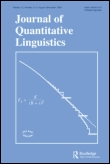
Journal of Quantitative Linguistics
Advancing Linguistic Insights through Quantitative AnalysisThe Journal of Quantitative Linguistics, published by Routledge Journals, Taylor & Francis Ltd, stands as a pivotal resource in the field of linguistics, particularly in the rigorous application of quantitative methodologies to language research. Since its inception in 1994, this esteemed journal has contributed significantly to the understanding of linguistic phenomena through empirical data analysis, and it continues to maintain its esteemed Q1 ranking in the linguistics and language category as of 2023. Researchers and professionals will find a wealth of knowledge within its pages, as it publishes original articles, critical reviews, and methodological developments that push the boundaries of language study. While the journal is not open access, it remains widely accessible through institutional subscriptions, ensuring that a diverse readership can engage with the latest findings and theoretical advancements. As the journal looks forward to celebrating 30 years of impactful research by 2024, it remains dedicated to fostering discourse and innovation in the examination of language using quantitative approaches.
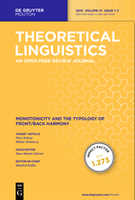
THEORETICAL LINGUISTICS
Illuminating the Path of Linguistic ResearchTHEORETICAL LINGUISTICS, published by Walter de Gruyter GmbH, is a prominent journal dedicated to exploring the intricate dimensions of linguistics, positioning itself as an essential resource for scholars and practitioners in the field. Established in 1974, this Germany-based journal has undergone significant evolution, contributing to the theoretical and empirical understanding of language with a focus on diverse linguistic phenomena. As evidenced by its Q2 ranking in the Linguistics and Language category for 2023, THEORETICAL LINGUISTICS engages with innovative theoretical discussions and methodologies, making it a vital platform for researchers navigating the complexities of language structure and usage. Though not an open-access journal, it ensures accessibility through robust distribution networks, fostering collaboration and knowledge-sharing within the academic community. With a consistent output from 1990 to 2024, this journal stands at the intersection of linguistics and language studies, appealing to a wide audience of researchers, professionals, and students alike.

Journal of Slavic Linguistics
Navigating the Complexities of Slavic Linguistic StructuresJournal of Slavic Linguistics, published by SLAVICA PUBLISHERS, is a key academic resource dedicated to the exploration of Slavic languages and linguistics. Established to provide a comprehensive platform for scholarly research, this journal addresses the intricate dynamics of Slavic phonetics, syntax, semantics, and discourse, making significant contributions to both theoretical and applied linguistics. The journal holds an impact factor that reflects its value in the linguistic community, particularly as it is ranked in the Q4 category in Linguistics and Language for 2023. With a focus on a wide range of topics within the field, the Journal of Slavic Linguistics serves as an essential reference for researchers, educators, and students alike, fostering an appreciation and deeper understanding of Slavic linguistic phenomena. Although currently not an Open Access journal, it remains accessible to a broad audience keen on engaging with contemporary linguistic scholarship.
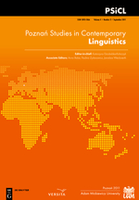
Poznan Studies in Contemporary Linguistics
Fostering scholarly discourse in language research.Poznan Studies in Contemporary Linguistics, published by DE GRUYTER MOUTON, is a pivotal journal in the field of linguistics, with an ISSN of 0137-2459 and an E-ISSN of 1897-7499. Located in Germany, this esteemed journal has consistently contributed to the academic landscape since its inception. As of 2023, it holds a Q2 category rank in Linguistics and Language and boasts commendable Scopus rankings, featuring in the 69th percentile for Arts and Humanities and the 66th percentile for Social Sciences. The journal emerges as a vital platform for scholars to explore contemporary linguistic theories and practices, making it an essential resource for researchers, professionals, and students alike. With a converged publication period from 2007 to 2024, it aims to facilitate a deeper understanding of linguistic advancements and trends. While the journal currently does not offer open access, its rigorous peer-review process ensures the highest quality of published research, strengthening its role as a leading discourse in the dynamic field of linguistics.

SKASE Journal of Theoretical Linguistics
Fostering Collaboration in Theoretical LinguisticsSKASE Journal of Theoretical Linguistics, published by the SLOVAK ASSOCIATION STUDY ENGLISH-SKASE, is a distinguished Open Access journal that expands the horizons of linguistic research and theoretical frameworks. With its ISSN N/A and E-ISSN 1336-782X, the journal has established itself as a pivotal resource for scholars in the field, achieving a commendable Q2 ranking in Linguistics and Language as of 2023. The journal, which has been in continuous publication since 2017, actively publishes innovative research studies, reviews, and theoretical discussions, easing access to groundbreaking work for academics and practitioners alike. Based in Slovakia, it connects a rich heritage of linguistic scholarship and is indexed in Scopus, ranking alongside its peers in both Arts and Humanities and Social Sciences categories. The SKASE Journal of Theoretical Linguistics is crucial for anyone interested in the evolving landscapes of linguistics, serving as an invaluable platform for disseminating knowledge and fostering collaboration amongst researchers worldwide.
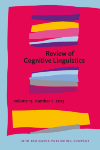
Review of Cognitive Linguistics
Exploring the Intersection of Language and MindThe Review of Cognitive Linguistics, published by John Benjamins Publishing Co, is a premier academic journal dedicated to the exploration of cognitive approaches to linguistics. With an ISSN of 1877-9751 and E-ISSN 1877-976X, this journal provides a critical platform for researchers and professionals to disseminate their findings in the rapidly evolving fields of linguistics and language, alongside developmental and educational psychology. Hailing from the Netherlands, the journal boasts impressive standing within the academic community, as indicated by its 2023 Q1 ranking in Linguistics and Language and Q3 in Developmental and Educational Psychology. Additionally, its Scopus rankings reflect a strong position within the arts and humanities and social sciences categories. While currently operating under a traditional access model, this journal actively contributes to the overarching discourse within cognitive linguistics, and is a vital resource for those aiming to deepen their understanding of the intricate link between language and cognition. Researchers, educators, and students are encouraged to engage with the rich body of articles spanning its convergence years from 2010 to 2024, making it an essential read for those at the forefront of these interdisciplinary studies.